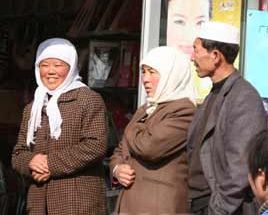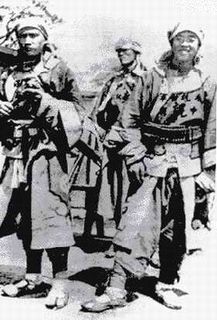
The Hui people are an East Asian ethnoreligious group predominantly composed of Chinese speaking adherents of Islam distributed throughout China, mainly in the northwestern provinces of the country and the Zhongyuan region. According to the 2011 census, China is home to approximately 20 million Hui people, the majority of whom are Chinese-speaking practitioners of Islam, though some may practise other religions. The 110,000 Dungan people of Kazakhstan and Kyrgyzstan are also considered part of the Hui ethnicity.

The Dongxiang people are one of 56 ethnic groups officially recognized by the People's Republic of China. Most of the Dongxiang live in the Linxia Hui Autonomous Prefecture and surrounding areas of Gansu Province in Northwestern China. According to the 2010 census, their population numbers 621,500.
The Bonan people are an ethnic group living in Gansu and Qinghai provinces in Northwestern China. They are one of the "titular nationalities" of Gansu's Jishishan Bonan, Dongxiang and Salar Autonomous County, which is located south of the Yellow River, near Gansu's border with Qinghai.

Islam has been practiced in China for about 1,400 years. Muslims are a minority group in China, representing between 0.45% to 2.85% of the total population according to the local government. Other independent sources claim between 60–80 million Muslims in China. Though Hui Muslims are the most numerous group, the greatest concentration of Muslims is in Xinjiang, with a significant Uyghur population. Lesser but significant populations reside in the regions of Ningxia, Gansu and Qinghai. Of China's 55 officially recognized minority peoples, ten groups are predominantly Sunni Muslim.

The Dungan Revolt (1862–1877) or Tongzhi Hui Revolt or Hui (Muslim) Minorities War was a mainly ethnic and religious war fought in 19th-century western China, mostly during the reign of the Tongzhi Emperor of the Qing dynasty. The term sometimes includes the Panthay Rebellion in Yunnan, which occurred during the same period. However, this article relates specifically to the uprising by members of the Muslim Hui and other Muslim ethnic groups in China's Shaanxi, Gansu and Ningxia provinces, as well as in Xinjiang, between 1862 and 1877.

The Ma clique or Ma family warlords is a collective name for a group of Hui warlords in Northwestern China who ruled the Chinese provinces of Qinghai, Gansu and Ningxia for 10 years from 1919 until 1928. Following the overthrow of the Qing dynasty in 1911, the region came under Chinese Muslim warlord Ma Qi's control until the Northern Expedition by the Republic of China consolidated central control in 1928. There were three families in the Ma clique, each of them respectively controlled 3 areas, Gansu, Qinghai, and Ningxia. The three most prominent members of the clique were Ma Bufang, Ma Hongkui, and Ma Hongbin, collectively known as the Xibei San Ma. Some contemporary accounts, such as Edgar Snow's, described the clique as the "Four Ma", adding Ma Bufang's brother Ma Buqing to the list of the top warlords. Other prominent Mas included Ma Anliang, Ma Qi, Ma Lin, Ma Hu-shan, and Ma Zhongying.

Ma Fuxiang was a Chinese military and political leader spanning the Qing Dynasty through the early Republic of China and illustrated the power of family, the role of religious affiliations, and the interaction of Inner Asian China and the national government of China. He was a prominent Muslim warlord in northwest China. Ma Fuxiang originally served under Dong Fuxiang, like other Ma Clique Muslim warlords such as Ma Anliang.

The history of Islam in China goes back 1,300 years.

During the Qing dynasty (1644–1911), the Qing rulers were Manchu, not Han, and were themselves a minority in China. The Qing dynasty witnessed five Muslim rebellions. The first and last rebellions were caused by sectarian infighting between rival Sufi Muslim orders.

Ma Anliang was a Hui born in Hezhou, Gansu, China. He became a general in the Qing dynasty army, and of the Republic of China. His father was Ma Zhan'ao, and his younger brothers were Ma Guoliang and Ma Suiliang 馬遂良. Ma was educated in Chinese and Islamic education. His Muslim name was Abdul Majid 阿卜都里默直底.
Ma Wanfu, also known as Hajji Guoyuan (果园哈只), was a Dongxiang Imam of Guoyuan village (果园村) in Hezhou. He studied in Mecca and founded the Ikhwan movement in 1888, also known as the "New Sect", spreading in Gansu, Ningxia and Qinghai. He opposed Sufism.

Dong Fuxiang (1839–1908), courtesy name Xingwu (星五), was a Chinese military general who lived in the late Qing dynasty. He was born in the western Chinese province of Gansu. He commanded an army of Hui soldiers, which included the later Ma clique generals Ma Anliang and Ma Fuxiang. According to the Western calendar, his birth date is in 1839.
Ma Fulu, a Chinese Muslim, was the son of General Ma Qianling, and the brother of Ma Fucai, Ma Fushou, and Ma Fuxiang. He was a middle born son.
Ma Dahan was a Dongxiang Muslim who rebelled against the Qing dynasty in 1895. Ma Dahan arranged a deal with the fellow Dongxiang Ma Wanfu when rebelling against the Qing dynasty. In Hezhou, Didao, and Xunhua they directed their adherents to join the rebellion. Guanghe, Sanjiaji and Tiaoheyan were agreed upon as points in a defensive position and they pledged that they would not surrender. Ma Wanfu betrayed Ma Dahan since he surrendered as the Chinese Muslim loyalist General Ma Anliang and Dong Fuxiang arrived to crush the rebel Muslims and Ma Dahan was killed while fighting to the death.
Ma Yonglin was a Chinese Muslim leader of the Multicoloured Mosque who participated in the Dungan revolt and the Muslim revolt of 1895 against the Qing dynasty. He antagonized mobs of Hui, Dongxiang, Baoan, and Salars to overthrow the Qing dynasty in Xunhua, Qinghai. Brigadier General Tang Yanhe sent soldiers to defeat the rebels. He belonged to the Khafiya Sufi sect. Ma Yonglin led assaults on Qing forces. Loyalist Chinese Muslims like Dong Fuxiang, and Ma Anliang defeated Ma Yonglin's rebel Muslim forces. Chinese Muslim officers like Ma Fulu and Ma Fuxiang opposed the rebel Muslims, and defeated them in combat.

The Dungan revolt (1895–96) was a rebellion of various Chinese Muslim ethnic groups in Qinghai and Gansu against the Qing dynasty, that originated because of a violent dispute between two Sufi orders of the same sect. The Wahhabi inspired Yihewani organization then joined in and encouraged the revolt, which was crushed by loyalist Muslims.
Yang Changjun was a Governor General in Qing dynasty China. He commanded the armies of the Qing dynasty during the Dungan Revolt (1895). His subordinates included Tang Yanhe, Dong Fuxiang, and various other generals.

The Kansu Braves or Gansu Army was a unit of 10,000 Chinese Muslim troops from the northwestern province of Kansu (Gansu) in the last decades the Qing dynasty (1644–1912). Loyal to the Qing, the Braves were recruited in 1895 to suppress a Muslim revolt in Gansu. Under the command of General Dong Fuxiang (1839–1908), they were transferred to the Beijing metropolitan area in 1898, where they officially became the Rear Division of the Wuwei Corps, a modern army that protected the imperial capital. The Gansu Army included Hui Muslims, Salar Muslims, Dongxiang Muslims, and Bonan Muslims.
Muslim Conflict in Gansu was when a coalition of Muslim Generals broke out in revolt against the Guominjun in 1927. Prominent among the rebels was Ma Tingxiang, the son of the General Ma Anliang, who received aid in the form of arms from Zhang Zuolin in Manchuria.
Ma Haiyan (1837–1900) was a Chinese Muslim General of the Qing Dynasty. Originally a rebel, he defected to Qing during the Dungan revolt and helped crush rebel Muslims.








